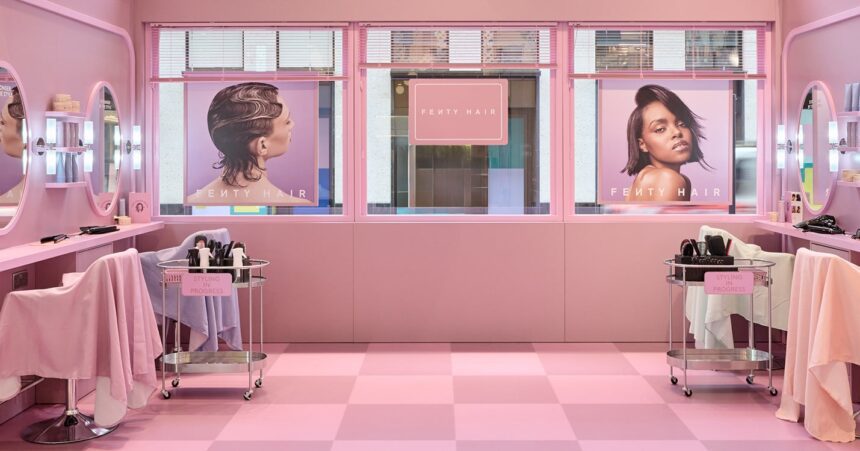
Fenty Hair Salon Pop-Up: A Mixed Experience for Customers
The recent launch of the Fenty Hair salon pop-up at Selfridges in London has generated significant buzz among beauty enthusiasts. Open from September 3rd to 28th, this unique salon experience required only freshly washed hair and a £35 fee, which could be redeemed for Fenty products. According to my calculations based on Girl Math, it felt like a complimentary service (or at least one that Rihanna was covering).
A New Chapter in Inclusive Haircare
This pop-up marked an exciting chapter for Fenty Hair by Rihanna, the haircare line introduced by the multifaceted Bajan artist earlier this year. Fenty Beauty has been pivotal in transforming inclusivity within the cosmetics industry, advocating for diversity and authenticity while challenging major brands to improve their shade matching practices. The so-called “Fenty effect” initiated a cultural shift, leading many brands to enhance their offerings for women with darker skin tones who previously felt overlooked.
High Hopes and Mixed Reactions
The Fenty Hair salon aimed to provide an inclusive environment where all hair types could receive exceptional care—especially those often neglected by mainstream salons. Clients were invited to select styles from a curated lookbook and receive personalized product recommendations tailored to their specific needs, focusing on repair, hydration, and protection. However, despite these intentions, some customers expressed dissatisfaction with how well their needs were addressed.
Among those sharing concerns was content creator @sincerelyoghosa, who documented her experience on TikTok after feeling that her 4C hair was not treated with the respect it deserved. In her viral video—which has garnered over 3 million views—she described feeling as though she was viewed as an inconvenience rather than a valued client: “From the moment I arrived at [the stylist’s] station, I sensed annoyance,” she recounted.
The Broader Issue of Texturism in Salons
The backlash against Fenty’s claims of inclusivity highlights ongoing challenges faced by Black women with coarser textures in salons—a phenomenon known as texturism. Oghosa’s experience resonated widely within this community and sparked discussions about how such biases persist even within brands that promote inclusivity.
A Response from Fenty Hair Salon
In response to Oghosa’s video, representatives from Fenty acknowledged her feedback and expressed regret that her visit did not meet expectations. They emphasized their commitment to ensuring every customer feels celebrated and well-cared-for: “We take this feedback very seriously,” they stated. “Our brand values have always centered around beauty for all.” This incident serves as a reminder of the importance of training staff adequately so they can cater effectively to diverse clientele.
This situation may reflect isolated issues rather than systemic failures within Fenty’s approach towards Black women’s beauty needs—but it does underscore areas needing improvement during preparations for such initiatives.
A Personal Reflection on Inclusivity Challenges in Beauty Services
I empathize deeply with Oghosa’s frustrations based on my own experiences navigating similar challenges as a beauty journalist when visiting exclusive venues like the inaugural Amazon Hair Salon. Initially excited about trying out services tailored specifically for afro-textured hair back in summer 2021 turned into disappointment when my appointment got postponed multiple times due solely because of my natural curls—despite assurances made prior regarding expertise available there!
This pattern is unfortunately common across various establishments catering primarily towards mainstream aesthetics while neglecting specialized knowledge necessary when dealing specifically with textured locks—a reality echoed repeatedly throughout social media platforms following Oghosa’s revelations regarding inadequate service received during her visit too!
Diverse Experiences Shared Online
While some patrons praised their visits at Fenty Hair salon—including several creators who shared positive reviews—others echoed sentiments similar those voiced by Oghosa concerning lackluster treatment received during appointments booked ahead-of-time! One user lamented having high hopes but ultimately feeling frustrated due delays experienced alongside stylists seemingly unprepared handle unique requirements associated particular hairstyles requested therein!
This issue extends beyond just one pop-up location—it reflects broader systemic problems prevalent throughout industry itself where representation matters significantly yet remains insufficiently addressed overall! Just recently influencer Kristen Mariella also highlighted struggles faced navigating spaces designed ostensibly serve diverse clientele without adequate resources available ensure everyone feels welcomed equally regardless texture type present amongst them…
“`html
Recently, a TikTok user shared her disappointing experience with a silk press at the prestigious Hershesons salon, which is known for its premium services. Kristen recounted how her hair ended up damaged and how the stylist struggled to work with her natural texture. As of now, Hershesons has not issued any public statement regarding this incident. Unbothered has reached out for their perspective.
I can empathize with Mariella’s situation. I once attended an event hosted by another popular high street hair brand featuring their celebrity stylist ambassador. Upon seeing my natural curls, he seemed alarmed and exclaimed, “What happened to your beautiful long hair?” likely alluding to one of my wigs. He continued, “The team showed me photos of you that didn’t match this.” Given his claimed two decades of experience across various hair types, I expected him to handle my natural texture adeptly. Instead, he resorted to using a fine-tooth comb on my coils and secured a loose French braid that looked lifeless with a rubber band. What was intended as a 45-minute appointment concluded in just 15 minutes. I felt humiliated enough to shed tears as I watched others leave looking polished while I appeared disheveled.
There was also an occasion when a silk press from another globally recognized salon failed spectacularly; it lasted only until my brief walk to the Tube station—by the time I got home 35 minutes later, my hair had transformed into an unruly fuzzball. Like many Black women, I’ve often found that my experiences in salons have frequently fallen short of expectations. In fact, we are often less loyal to salon experiences in the UK, primarily because finding establishments capable of addressing our unique curls outside major urban areas can be quite challenging—leading many of us to take on our own hairstyling.
Black women are exhausted from being told their afro-textured hair is difficult or unmanageable (it’s not; it simply requires proper knowledge).
Reflecting on my upbringing, the closest thing resembling professional hairstyling was when local aunties would braid in their kitchens while managing family duties simultaneously—a chaotic environment somehow led to better results so complaints were rare! However, Black women deserve luxurious salon experiences just like anyone else does; we invest six times more on beauty and hair services than other demographics in the UK. It raises questions about why we still encounter stylists who lack proficiency in handling afro textures—especially type 4C—in 2024.
The British Beauty Council made strides back in 2021 by advocating for mandatory training on the cutting and styling of afro-textured hair as part of National Occupational Standards (NOS). While it’s unrealistic for every stylist nationwide to master afro textures completely—I wouldn’t expect expertise from my dentist regarding headaches—it’s crucial that brands claiming inclusivity genuinely uphold those standards or face scrutiny.
Sherrille Riley—the founder behind Beauty Edit Mayfair, boasting over two decades in hairstyling—shared valuable insights: “If you market yourself as diverse then your staff must be adequately trained.” She emphasized that true specialization requires extensive training coupled with passion and regular practice within relevant communities: “To bridge this gap effectively involves proactive recruitment strategies right from inception.”
The negative feedback surrounding Oghosa’s visit at Fenty Hair may stem from isolated incidents rather than systemic issues; however it highlights potential oversights during planning phases where something clearly went awry concerning service delivery standards aimed at Black women’s beauty needs since Fenty’s launch.
It remains essential that Black women’s feelings are validated given historical patterns where they’ve been gaslit into believing they’re at fault.
A demand for respectful treatment towards 4C textures within mainstream salons isn’t excessive—it reflects ongoing frustrations among Black women who tire hearing claims about unruliness associated with their natural hairstyles (which merely require informed care). Although influencers like Oghosa or Mariella may share infrequent negative encounters relative brands striving toward improvement efforts—they underscore broader industry challenges needing attention.
Accountability is paramount: if salons wish truly embody inclusivity principles—they must invest significantly into staff training ensuring every client receives expert care tailored specifically towards individual needs before commencing any treatments alongside transparency regarding products utilized throughout processes involving textured locks!
“`






